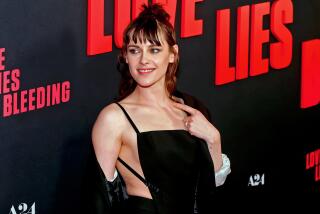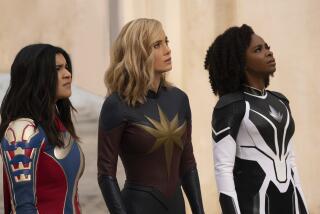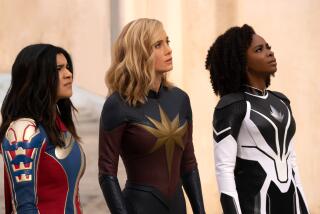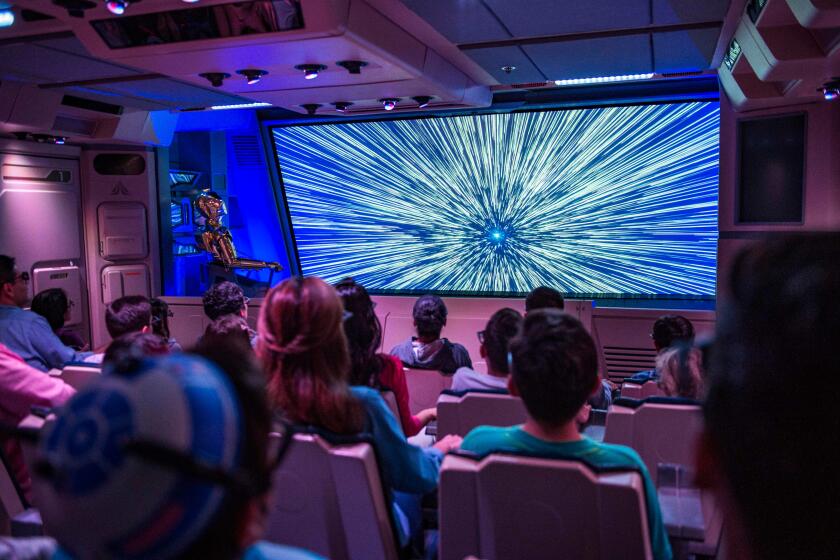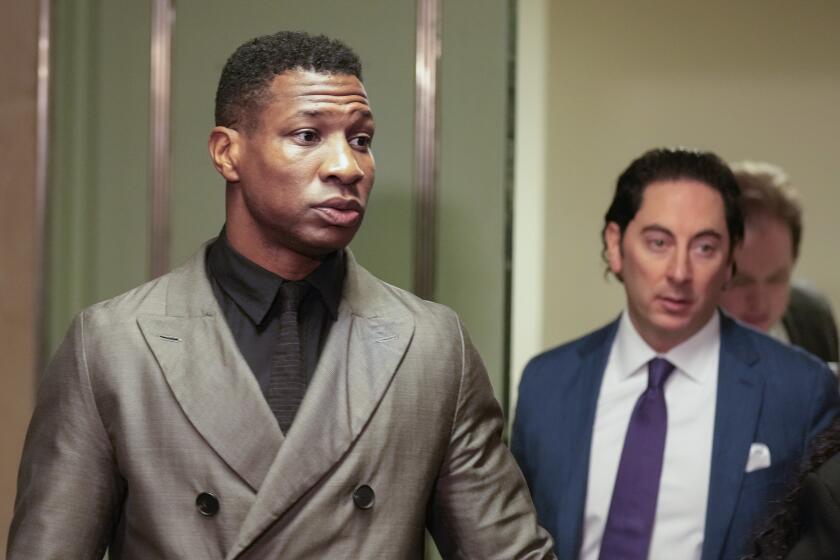Scarlett Johansson on how the long wait revealed the right timing for Marvel’s ‘Black Widow’
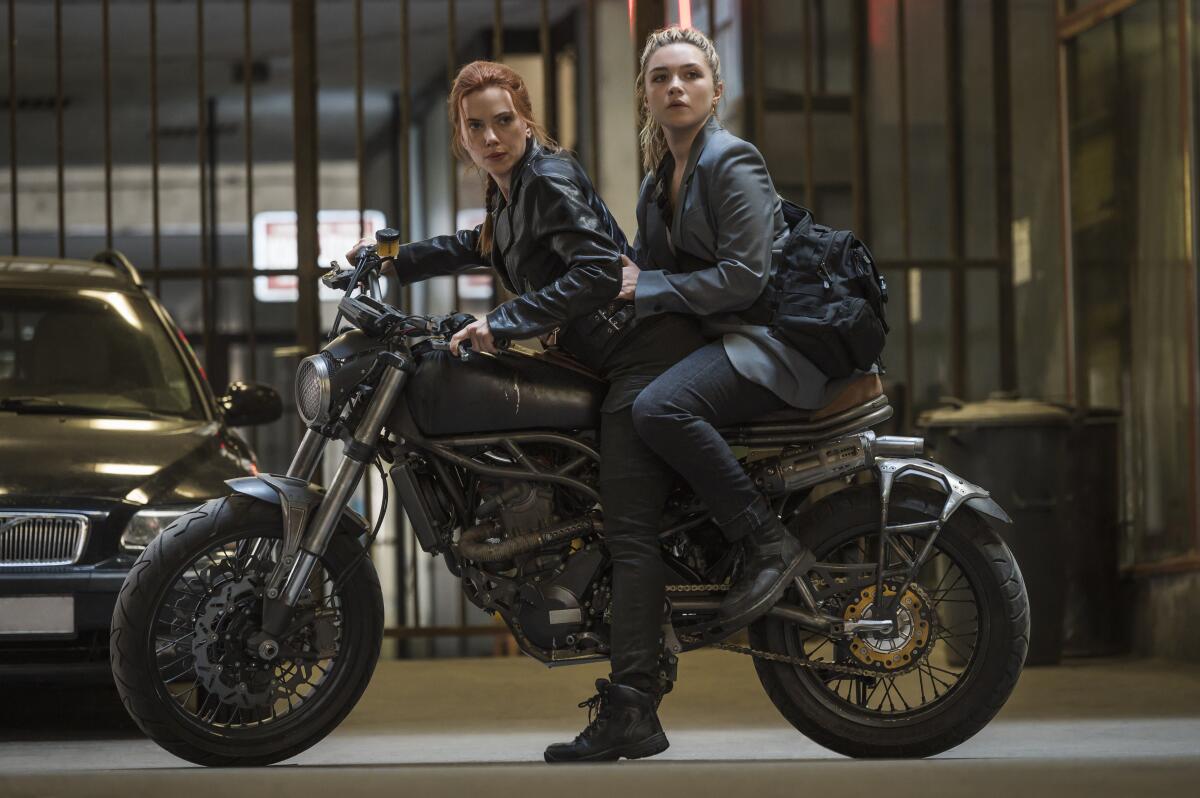
More than 10 years after her character’s first onscreen appearance — and another 14 months since it was originally planned for release — Marvel’s “Black Widow” standalone film is finally here.
Opening simultaneously in theaters and as a “premier access” title on Disney+ this Friday, “Black Widow” is set between the events of “Captain America: Civil War” and “Avengers: Infinity War” and represents the swan song of Scarlett Johansson’s original Avenger, Natasha Romanoff. And it feels even more final, considering (*spoiler alert*) the character sacrificed her life in exchange for an infinity stone in 2019’s $2.8-billion grossing blockbuster “Avengers: Endgame.”
Putting Romanoff to rest in “Endgame” only to dive into promotion for her first solo venture two years later has been very weird, Johansson says.
“Normally you don’t have this much distance from something,” she said by Zoom during a recent virtual press day. “Not only is there so much distance, but the distance has [provided] such a weird time of self-reflection for all of us. I’ve had so much time to think about and appreciate this experience.”
A former KGB operative and assassin turned Avenger, Natasha was first introduced to the Marvel Cinematic Universe in 2010’s “Iron Man 2.” Despite being the team’s first female hero, “Black Widow” comes two years after “Captain Marvel” became the first Marvel heroine to get a standalone outing. But would Natasha have survived “Endgame” if her solo film had come sooner?
“I don’t know if it would’ve changed her fate,” said Johansson. “It’s hard to say. When we went into ‘Endgame,’ we knew that there were going to be some big sacrifices. [So] when I got the call from [Marvel Studios President Kevin] Feige, I kind of anticipated it. It didn’t feel wrong but it was still heartbreaking. But whether if we made it earlier it would’ve changed her ultimate fate, I have no idea.”
On the other hand, director Cate Shortland is certain that this movie couldn’t have been made any other time. “Two things happened [that made this film possible]: ‘Black Panther’ created space for both filmmakers and for diverse voices, and I also think it gave the studio confidence that we would come and see those movies. I think the expectation was that we wanted to watch white men and if they weren’t white men, we wouldn’t come.
“And after the #MeToo movement, the other thing that happened was we could say what we wanted to say; we could make jokes about women’s trauma and the control of women’s bodies. I think the expectation was that we were going to make a dark film and so we wanted to say ‘No, we’re not going to make a dark film because we’re not victims. These girls are going to kick ass.’”
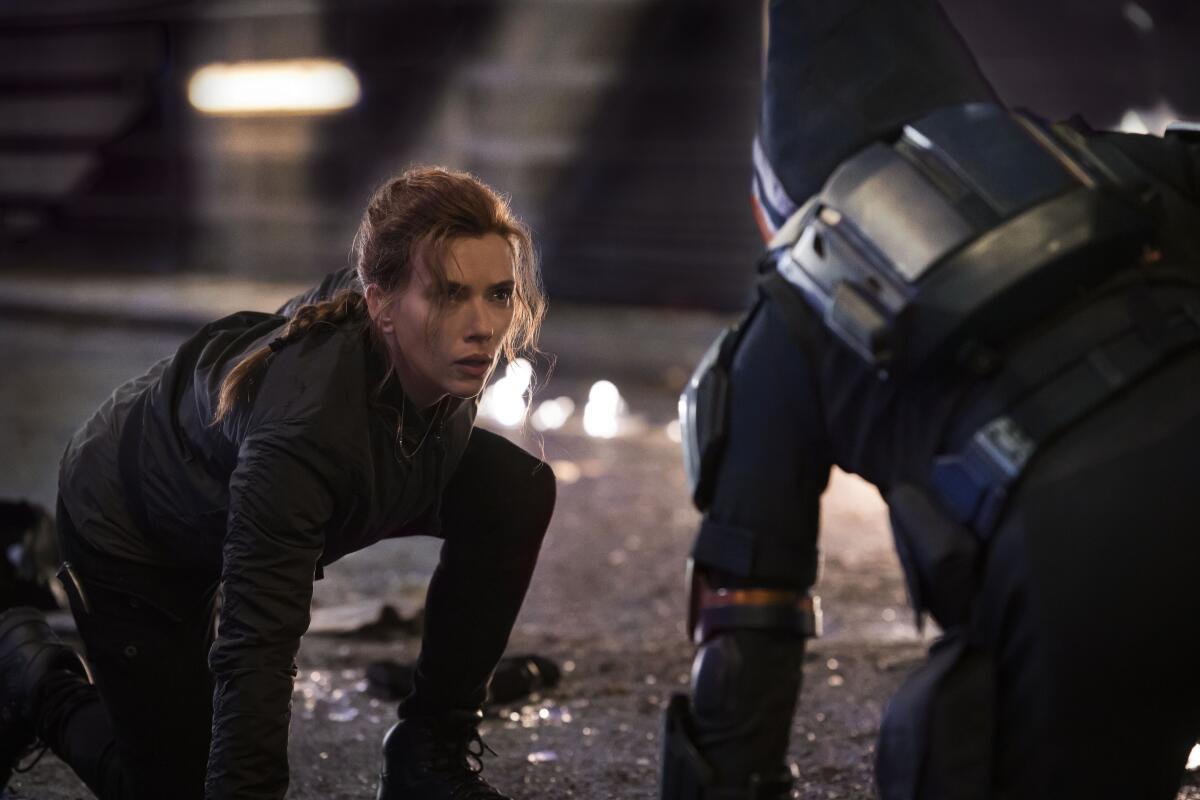
Aside from a quick peek into her memory in “Avengers: Age of Ultron” (2015), Natasha’s backstory has never been depicted in detail. “Black Widow” aims to fill in some of the gaps, offering a glimpse into her early life and time in the Red Room, a Soviet brainwashing and training program that transforms vulnerable young girls into elite assassins.
“We had to dig and find what was the heart of our story,” said Shortland. “[Marvel producers] Kevin [Feige] and Victoria [Alonso] and Louis [D’Esposito] really encouraged me to go beyond the ideas of femme fatale, superhero, all this kind of stuff and think, ‘OK, who is she as a human being?’”
The film also introduces Natasha’s makeshift family unit of spies (à la “The Americans”) complete with matriarch Melina (Rachel Weisz), dad Alexei (David Harbour) and younger sister Yelena (Florence Pugh), a fellow assassin (or widow, as they’re known in the film).
“It’s always exciting when [new] people join the Marvel family because it’s such a wonderful group of people that I love dearly,” said Johansson. “And you know so many exciting things are coming for them. I think more than anything I just felt very excited for Florence that it’s the beginning of what I’m sure will be a really wonderful partnership for many years to come.”
Pugh, the British actress who has earned increasing fame with an Oscar-nominated turn in “Little Women” and the starring role in the cult horror movie “Midsommar,” spent months in stunt training to play Yelena, a recently defected widow who makes it her mission to take down the Red Room. “It was exhilarating,” she said. “The style of fighting was so quick — it was hand-to-hand combat — so it always felt fulfilling when we’d finished a really good scene. It felt like we’d achieved something.
“From an audience member’s [perspective], you think that everybody [in Marvel movies] is doing all of this work and they’re working out all the time and they’re actually flying across stage — which they are,” she added. “So when I signed on, I really wanted to make myself available and throw myself into it because I’d never been in this world before. Also, learning how to kick-box and knife throw from a professional are really cool skills to have so I didn’t mind.”
Johansson passed on the same advice to Pugh that Samuel L. Jackson had given her years earlier: Preserve your energy and don’t be too hard on yourself.
“I remember when Florence and I were doing our fight scene, she was frustrated that she wasn’t getting a piece of it,” Johansson said. “I said ‘Look, this shoot is long and your stunt double is a professional athlete. They’ve been doing it for 16 years ... you’re never going to reach that level of athleticism in four weeks. The grit that comes from all of the character stuff that you’re working on is going to be far more valuable, so don’t get so frustrated with yourself for not being a professional assassin after a month.’”
“I think Scarlett was really open about how to work within this system,” said Shortland. “How to be an actor, but also how to be a stunt person. What I saw on set was an [experienced] actor being really open and heartfelt and getting Florence comfortable with a really complex way of working.”
“These films are so long and they’re very physically taxing,” said Johansson. “When I first started [in the MCU] in ‘Iron Man 2,’ there was this massive fight sequence in this hallway corridor. We prepped it for a long time before we started shooting and it was continuous training [before] eventually shooting this thing over weeks. 10 years ago, a lot of actors were doing more practical work in terms of stunts so it was really grueling and also daunting because I’m not a professional athlete.”
“I think what’s beautiful is Scarlett has found herself over the last 10 years and what we’re watching with Natasha is the same process,” said Shortland. “I think that’s a gift.”
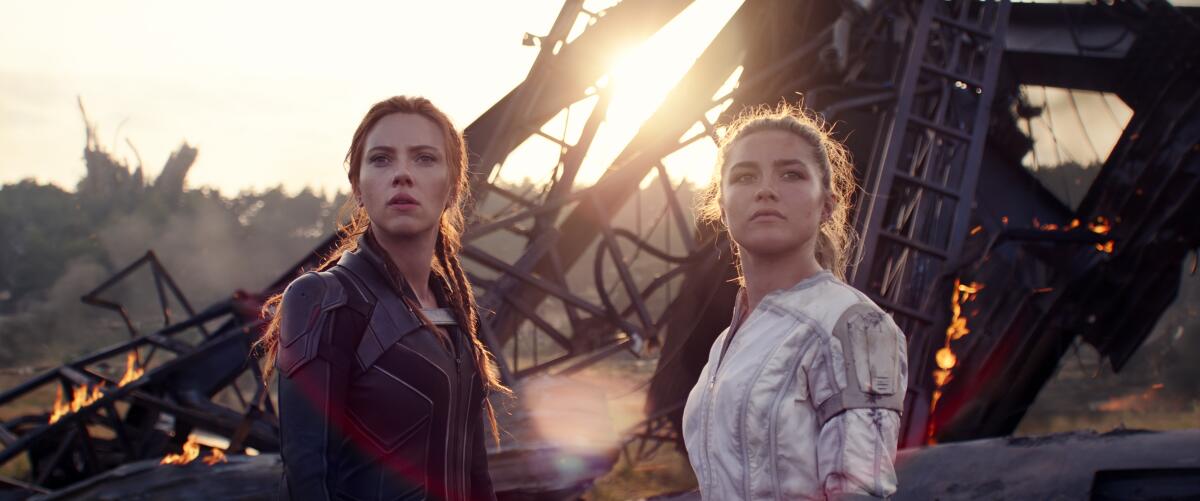
Before the pandemic upended release schedules across Hollywood, “Black Widow” was planned to be the official start of Marvel’s Phase Four. It’s still the first film but has been preceded by Marvel TV series “WandaVision,” “The Falcon and the Winter Soldier” and “Loki,” which all take place after the events of “Endgame.” But the delay had some unexpected benefits, Johansson says.
“Selfishly, it gave us more time to work on the film,” she said. “We had a really quick turnaround, initially. We wrapped it at the end of summer [2019] and we were delivering it May 1. It was just very, very quick. I think it was the quickest Marvel has ever turned around a feature. So we tried to give it our best shot but you’re always going to wish you had more time. And then when we got more time we were able to fine-tune it.”
“I’m really grateful that they held out and waited to release it properly with a cinematic release,” said Pugh. “I know that a lot of people are bummed out that it hasn’t been [available] on laptops for the last year but when you work so hard on something ... I mean, it is such an epic film. It’s so impressive that it would’ve felt really sad for it to have come out in any other way. So I’m really impressed that it’s been kept for this moment and now people can go enjoy it in its full glory.”
“I think strangely there’s a lot of space for it now,” said Johansson. “It was a very crowded time when we were releasing it before and I think it has a lot of breathing room [now], which is fantastic. It’s what you wish you could have with any big release. And I think it’s a good film for now. The movie’s about the family you choose and after being separated for such a long period of time and everybody reevaluating the things that are most important to them, this film coincidentally reflects a lot of what we’ve all been thinking about for the past two years.”
With the Infinity Saga wrapped up, it seems like the next chapter of the MCU will revolve around the idea of a multiverse, as hinted in “Endgame” follow-ups “Spider-Man: Far From Home” and “Loki.” So could there be a chance that Johansson might reprise her character after all?
“The whole concept of the multiverse is interesting to me, mostly because I’m fascinated with the idea of an alternate reality,” she said. “Like the sliding-doors concept I think is really interesting. But I don’t know if I could commit emotionally to a multiverse storyline. I don’t know. I can’t even wrap my head around it.”
She laughed. “Now I’m going to be ruminating on it for the rest of the day.”
More to Read
Only good movies
Get the Indie Focus newsletter, Mark Olsen's weekly guide to the world of cinema.
You may occasionally receive promotional content from the Los Angeles Times.
